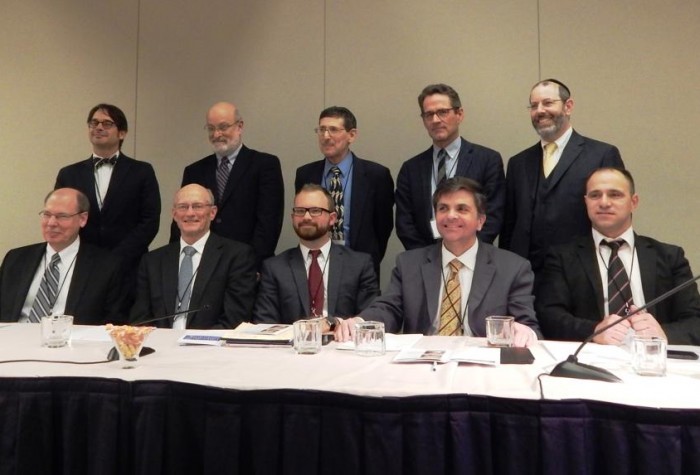New Christian Zionists Seek Distance From 'Wild, Crazy Popular Apocalypticism'

A group of Christian scholars representing a "new Christian Zionism" seek to distance their views from the "wild, crazy, popular apocalypticism" with which Christian Zionists have often been associated.
Eleven speakers, mostly theologians, presented at the April 17 conference, "People of the Land: A Twenty-First Century Case for Christian Zionism," hosted by the Institute on Religion and Democracy at Georgetown University in Washington, D.C. Most of the talks were based upon a chapter for a book expected to be published sometime in the next two years.
While the group does not agree on everything, they are united in the belief that God's covenants with Israel were not displaced by Jesus Christ and the Church. In other words, while Jesus is central to salvation, God will remain faithful to the promises He made to the Jewish people. How, exactly, that works itself out will continue to be a matter of study and debate.
One of the difficulties Christian Zionists have had is that dispensationalism, a theological view held by a large subset of Christian Zionists, has been misrepresented in the media and associated with "the wildest excesses of a popular apocalypticism," Craig Blasing, executive vice president, provost, and professor of theology at Southwestern Baptist Theological Seminary, explained during the Q&A.
While dispensational theology has changed a lot over the last 30 years, dispensationalists are still associated with the older version of dispensationalism, Blasing continued.
"We do need to recognize that there is a dispensational element that is not wild, crazy popular apocalypticism," he said.
Many popular Christian books about the end times were based upon some dispensational-type teachings. In the 1970's, for instance, Hal Lindsey's The Late, Great Planet Earth was a best selling book, which led to a cottage industry of end times books. There were also popular fictional works, such as Tim LaHaye and Jerry Jenkins' Left Behind series, which have been made into films. A recent example is Pastor John Hagee's Four Blood Moons. Christianbook.com currently has a "Prophecy & End Times" section with 1,458 works.
This pop-apocalypticism was also on display recently when former congresswoman and presidential candidate Michele Bachmann said on a radio show that the end times were near and associated that prediction with President Barack Obama's foreign policy.
One difference, Blasing said, was that the older dispensationalism treated Israel and the Church as two different people groups. A Jew who became a Christian was considered no longer Jewish, under this view. The newer "progressive dispensationalism" or "wholeism," however, disagrees.
"There is a wholistic theology that is multi-national, multi-ethnic, all united in Christ. That is what fulfills the reality of the Church," he said. "So consequently, a Jewish believer today is part of God's plan and purpose in the consummation for the Jewish people. A gentile believer today is part of a plan of God's purpose for gentile peoples. Both peoples, all peoples, if redeemed, are united with Christ in a kingdom that is coming."
Darrell Bock, senior research professor of New Testament Studies at Dallas Theological Seminary, agreed with Blasing but added that Christian Zionists should acknowledge the role they played in becoming associated with pop-apocalypticism.
"Sometimes you get what you pay for. We created an environment in which popular apocalypticism was part of what we were known for almost exclusively. We have to bear the burden of some of that," he said.
At the same time, Bock hopes that the broader Church and the media will seek to understand what the New Christian Zionists are arguing.
"Please let us be who we are by giving us the respect of listening to what we are now saying," he urged.
The conference speakers did not take a single position on what their theology means for the current state of Israel. At least one speaker said that supporting a two-state solution for the current Israeli/Palestinian conflict would not necessarily be inconsistent with his theology. Another speaker said he makes a distinction between the current state of Israel and the "covenanted people of Israel."
"I don't know if the rest of the panel would agree with me, but I think there's a distinction between the State of Israel and the covenanted people of Israel, and that it's important to make that distinction. For one, so that the state of Israel is not seen as a redemptive thing on its own. But secondly, because the state of Israel is such a mixed bag ... Who then, represents the covenanted people? ... What part of the Jewish tradition? And the second question people also struggle with, what kind of scope is there to that land that's promised? And I don't have any answers to that," said Robert Benne, Jordan-Trexler Professor of Religion and Chair of the Religion and Philosophy Department at Roanoke College.
During closing remarks, the speakers were asked to give one-sentence answers to the question, "what is new about this supposedly new Christian Zionism?"
Mark Tooley, president of the Institute on Religion and Democracy, answered that he hopes the new Christian Zionists will become better known for their theology than their politics, and that they demonstrate prudence when their theology informs their politics.
"The new Christian Zionism should artfully weave together both prudential and theological arguments, keeping in mind that the past 40, 50, 60 years, typically Christian Zionists have focused on one and not the other. They both depend on each other," he said.
Videos of all the presentations will be posted on IRD's blog, JuicyEcumenism.com.




























